7 Inexpensive Ways to Cover a Chain Link Fence
Add Privacy and Style to Your Chain Link Fence
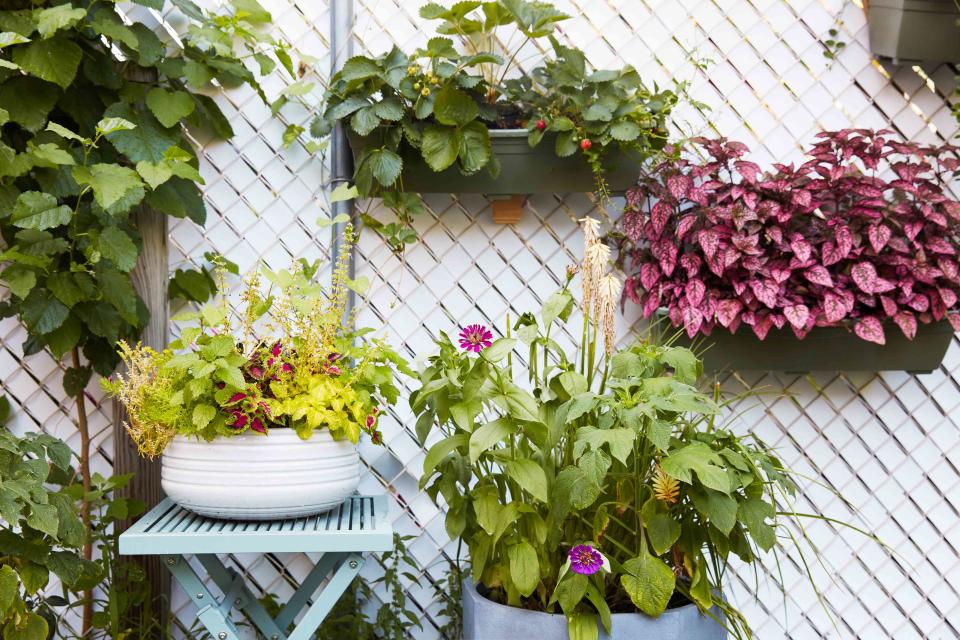
The Spruce / Margot Cavin
Reviewed by Kelly BaconFact checked by Alexandra Kay
Chain link fences are a functional way to enclose an outdoor space. They're known for their durability and strength, but this style of fence isn't known for its privacy or aesthetically pleasing properties. Other than being an affordable, effective method of keeping pets and children safe, chain link is sometimes viewed as a blight on yards. In fact, some communities even ban chain link fences in incorporated, residential areas.
Rather than building a privacy fence or removing the chain link fence, an easier and far lower-cost alternative is to upgrade the fence for a polished look with plenty of privacy. Covering your chain link fence also helps protect it from the elements to make it last longer over time. Options range from traditional chain link fence slats and mesh to bamboo, reed, and wood fence panels.
Here, discover inexpensive ways to cover a chain link fence to upgrade your space and offer some privacy.
Chain Link Fence Covering Considerations
When choosing a fence covering for this type of fence, consider the following:
Durability: A chain link fence may outlive any covering you choose. Decide how often you are willing to redo a chain link fence covering.
Ease of installation: How much labor do you want to put into installation? Some solutions are easy, others are more labor-intensive.
Maintenance: Some solutions, like plants, require maintenance.
Cost: Most solutions are inexpensive, except for a couple of full-coverage options. The lower the cost, the less durable the option, which means the more frequently you'll need to buy a new covering.
Chain Link Fence Slats
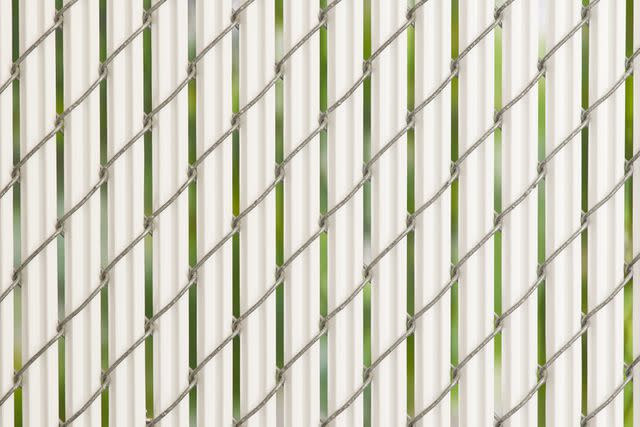
The Spruce / Jacob Fox
Chain link fences allow for long, narrow pieces to be inserted vertically to add privacy. Individual slats slide in easily from the top and stay in place without means of attachment. Slats are made of either high-density polyethylene or aluminum and can last for decades or be quickly changed out if damaged. This is one of the most neutral options, so it can blend with any yard.
The slats offer 75 to 80 percent visual blockage for privacy. Ten linear feet of chain link slats at 6 feet high cost around $90 to $110.
Pros
Inexpensive
Very durable
Cons
Incomplete privacy
Slow installation
Full Bamboo Screens

The Spruce / Jacob Fox
Rolled bamboo fencing can be a natural, attractive way to camouflage a chain link fence. The bamboo fencing is constructed from attached poles ranging in thickness from 3/4-inch to 2 inches. Full bamboo pole screens can be installed directly onto a chain link fence by tying it to the rails and poles with foot-long pieces of 16-gauge wire. Bamboo is durable but it is organic and can deteriorate over the years. The resulting look will work well in a garden space with clean lines and foliage one might see in a Japanese garden.
This fencing can offer 85 percent coverage for privacy. A 16-foot long by 6-foot high panel of bamboo fencing can run between $50 to $100 but prices greatly vary per company.
Tip
Choose poles that are cut on the bamboo nodes, as they do better than poles that have exposed ends. The nodes act as natural weather-resistant caps.
Pros
Attractive
Natural
Cons
Not durable if untreated
Expensive
Wooden Fence Panels
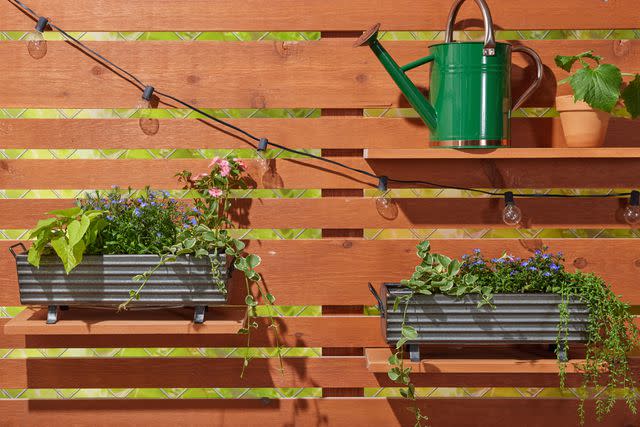
The Spruce / Jacob Fox
Regular wooden fence panels can be screwed onto chain link fences using U-brackets. Since these panels are been pre-constructed in a factory, there is no need to individually nail up boards. You will need access to the back side of the chain link fence in order to attach the panels to the fence. Once completed, this option will give you a warm and rustic look that is close to a regular wooden fence.
Tip
Besides regular sealing, one trick to preserving wood fence panels for the long term is to prevent ground contact. When wood panels touch the ground, water wicks up through the wood.
Durability is usually excellent. If you use cedar, this wood is naturally weather-resistant because it is very oily but any species can be sprayed with sealer.
Privacy coverage is high (about 90 percent). It is not inexpensive. A single wood fence panel 6 feet high and 8 feet long costs between $145 and $160.
Pros
Good for privacy
Looks like a real wood fence
Offers full coverage of chain link fence
Cons
Large, heavy fence panels difficult to handle and install
May need fence permit to install
Expensive
Reed Screens
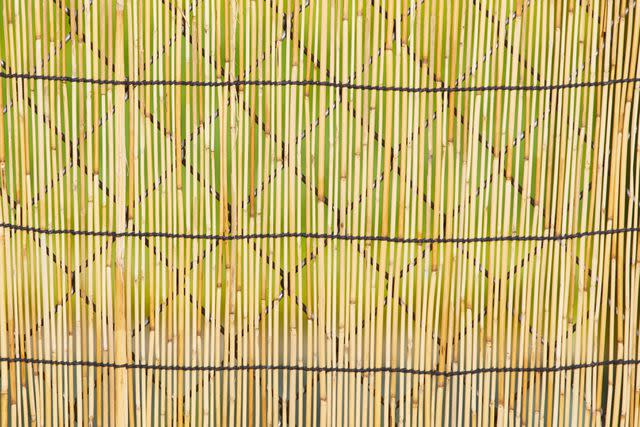
The Spruce / Jacob Fox
Thin bamboo reeds about the thickness of a drinking straw are woven together into 8- to 16-foot-long mats. These rolls are easy to carry and transport back from the home improvement store. Reed screens are usually installed vertically and stay attractive for about two years before needing replacement. These thin reeds feel beachy and tropical, so they are ideal for a coastal yard.
Reed screens offer about 85 percent privacy when new. As the screen falls apart, privacy drops as well. A roll of 6-foot by 16-foot reed screen costs about $28 to $35.
Pros
Inexpensive
Fast and easy to install
Cons
Deteriorates quickly
Rapidly changes color
Mesh Wind Screen/Privacy Screen

The Spruce / Jacob Fox
At first glance, a mesh windscreen on a fence looks like a tarp. But a mesh privacy screen is designed specifically for fences. A mesh privacy screen is very durable and can last for years since it's UV-rated polypropylene, water-, and wind-permeable. It has a double-thick trim around the perimeter, and brass grommets on the trim so that you can attach it to the chain link with zip-ties. However it's woven, so it will eventually wear. This material can easily blend into the background if you have some shrubs, trees, or other greenery planted along your fence, almost camouflaging it.
Privacy ranges from 80 to 96 percent, depending on how much you are willing to spend. Mesh screening is a low-cost solution. Lower-quality privacy screens (85 percent blockage) are the least expensive, costing under $100 for a 6-foot high by 50-foot long screen. But costs vary greatly per size of screen, manufacturer, or seller. Screens with 96 percent blockage may cost about 50 percent more.
Pros
Nearly 100 percent privacy screens available
Inexpensive coverage for large expanses
Cons
Basic, utilitarian look and not very attractive for residential use
Dark colors succumb to UV rays faster
Live or Artificial Plants
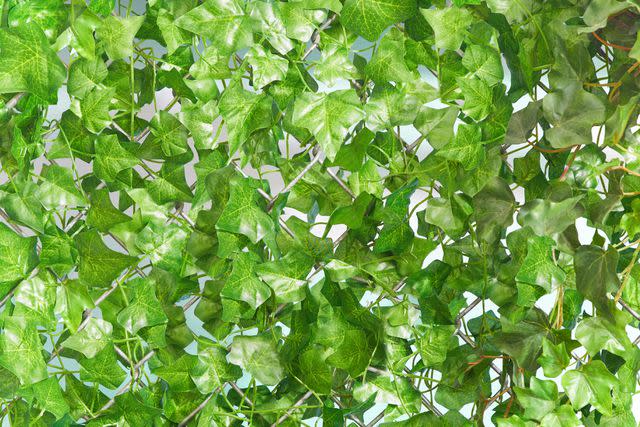
The Spruce / Jacob Fox
If you're hoping for a wall of greenery, you have a few options, including artificial or real plants. Privacy screens woven with faux ivy vines is an option that can be rolled across one side of a fence. It can instantly camouflage the chain link fence but weather will affect the aesthetics of the material over time. It offers just about full coverage. A 3- to 5-foot by 10-foot high panel can cost between $40 and $80-plus depending on the level of detail, such as faux flowers.
For real ivy, try evergreen vines, such as English ivy, to create a living wall, but you will need to be patient to see results that will offer season-to-season coverage. Otherwise, plant taller privacy hedges in front of the fence, though the faster-growing shrubs will only grow around 2 feet a year. Regardless of if you choose real or faux vines, they will give your yard a secret garden feel.
Pros
Artificial screening offers full coverage
Artificial screening can be inexpensive
Artificial screening is easy to install
Cons
Artificial screens may fade
Real plants take too long to grow for coverage
Covers only one side of fence
Privacy Tape
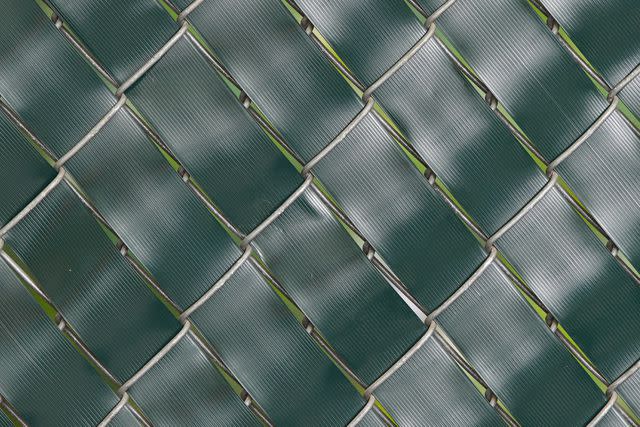
The Spruce / Jacob Fox
Privacy tape differs from slats in that the tape is thinner and installed on a diagonal through the chain links. The tape is typically made of low-density polyethylene treated with color and UV inhibitors. But it's labor-intensive to install, especially on large expanses of fencing. Tape usually comes in a variety of colors and it attaches with fasteners. The tape is highly durable and is designed to withstand high heat and frigid temperatures, usually only requiring pressure cleaning to freshen it up.
Diagonal weaving with tape offers more privacy coverage (about 90 percent) than vertical slats. Tape is also less expensive, costing about $40 to cover 40 square feet (250-foot long roll). The main focus of this option is getting maximum privacy, not aesthetics. But the overall style is simple and likely won't clash with your landscape design.
Pros
Great coverage
Low cost
Durable
Cons
Labor-intensive installation
Not the most aesthetically pleasing option
Thinner material than slats
How to Choose a Chain Link Fence Covering
There are more options than ever for covering up a chain link fence. It just depends on how much work, maintenance, and money you want to put into the project. For the least expensive route, choose tape, mesh, or even rolled bamboo. For the more expensive way to achieve full coverage that's attractive, go with wooden fence panels.
24 Backyard Privacy Ideas for a Quiet Retreat
Frequently Asked Questions
How can you make your yard more private when your neighbor has a chain link fence?
If your neighbor is the one with the chain link fence and you do not want to infringe on their property, select a chain link fence privacy covering that only has to be secured to your side of the fence, like a bamboo screen. You can also plant shrubs and other greenery to obstruct their views.
Is it better to add privacy to a chain link fence or build a new fence?
Keeping a chain like fence and adding privacy is an easier and much less expensive option than replacing it. There are even some privacy coverings that mimic the look of a wooden fence.
Read the original article on The Spruce.

